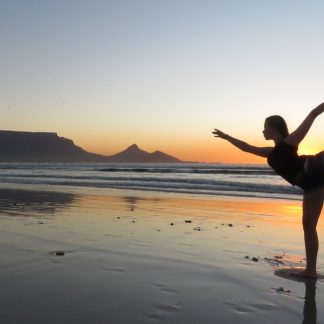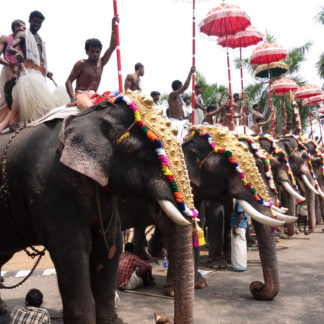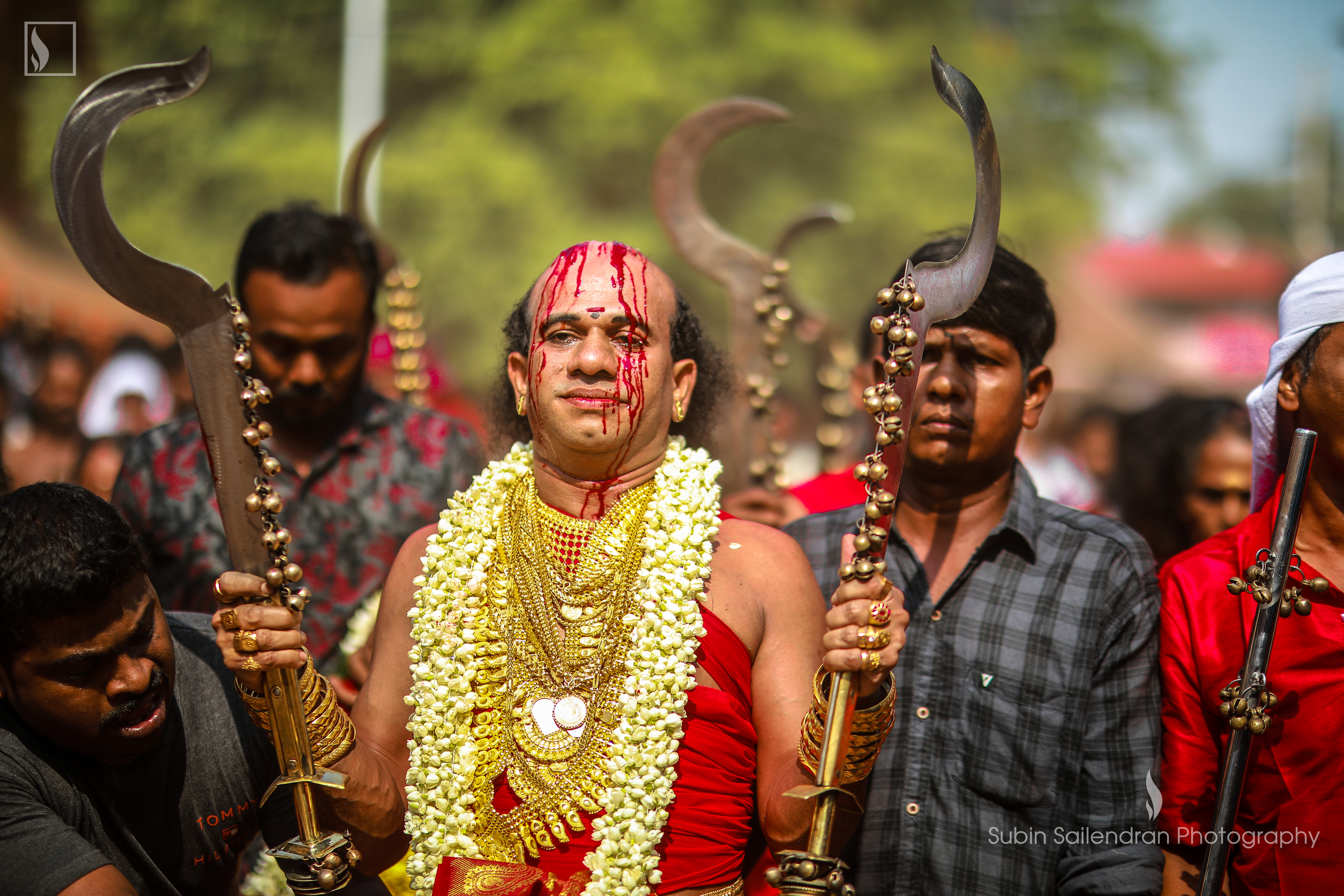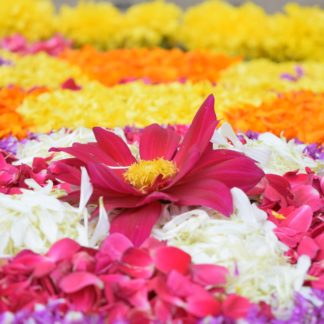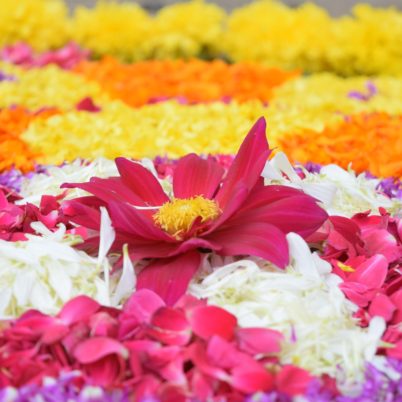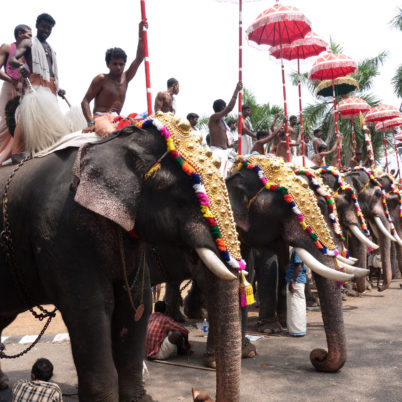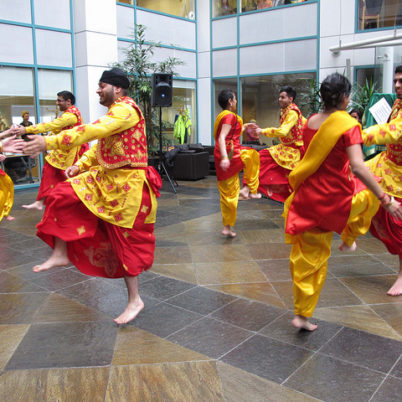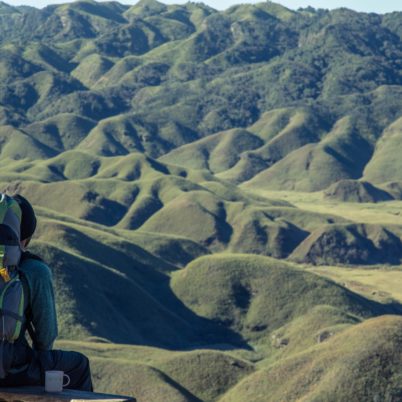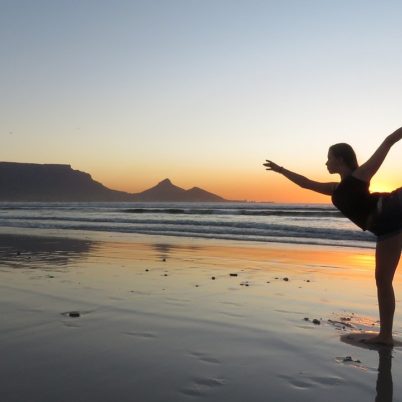Experiencing Diwali In India
Created by Harsh Sonawala,Last Updated on April 4, 2024
Experiencing Diwali in India is an experience like no other! If we had to pick two festivals that you must definitely experience in India, it would have to be either the festival of colors Holi (March), or Diwali (October or November), known as the festival of lights. Both these festivals are a sight to behold.
Diwali takes place on different dates every year. It occurs in October or November. The Diwali dates in 2024 are from 28 October to 3 November.
So if you are travelling in India during Diwali, you have to experience the festival in the authentic way. In this blog, we will talk about experiencing Diwali in India and celebrating the festival of lights!
You can read these blogs to get an idea of what the weather in India is like in October and November.
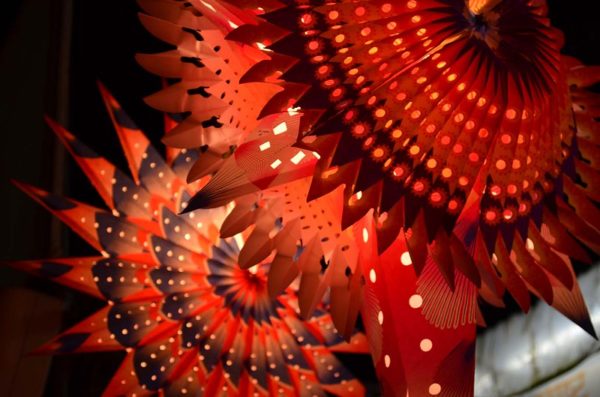 Different types of lanterns hang in windows around Diwali (Photo Credit – Kenkrevarun)
Different types of lanterns hang in windows around Diwali (Photo Credit – Kenkrevarun)
Diwali in India- An Overview
The name Diwali comes from the Sanskrit word “deepawali”, which means “rows of lights”.
Diwali in India is as important to Indians as Christmas is in the West. It is a five day festival, and India’s biggest holiday. Most Hindus observe Diwali, which occurs in October or November every year.
Common traditions during Diwali include cleaning and redecorating the house, buying new clothes, lighting diyas (lamps), exchanging gifts, making and eating sweets together as a family, and bursting firecrackers at night. Friends and families gather together for this festival. Diwali is celebrated as a fresh start with the belief that good triumphs all evil.
As a traveller in India, if you are anywhere in North, Central, or Western India, you will feel the festive vibe in the air. This is a festival that brings all of India together, regardless of caste and religion. Indians are friendly, curious people, so don’t be surprised if you get invited to someone’s house to join in the celebrations.
If experiencing Diwali in India is on your wishlist (something we highly recommend), plan your trip with us now, so you can properly experience the grandeur of the festival of lights.
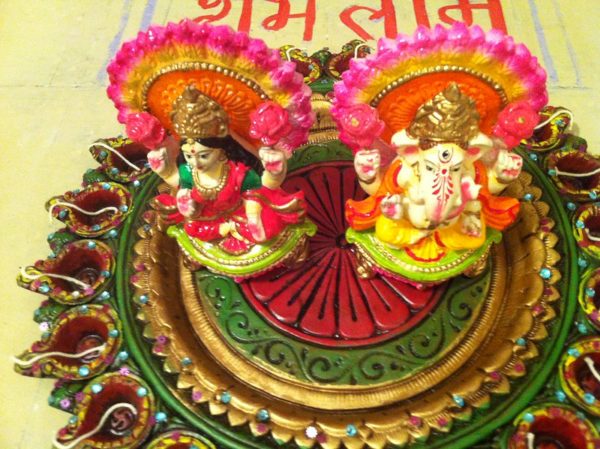 Partake in the Diwali Puja, and see if you can spot the Elephant God Ganpati (Photo Credit – Ian Brown)
Partake in the Diwali Puja, and see if you can spot the Elephant God Ganpati (Photo Credit – Ian Brown)
Why is Diwali celebrated?
Diwali marks the beginning of a new year in the Hindu calendar in India. It symbolises the victory of light over darkness, good over evil, and hope over despair. Hindus light up their homes with lanterns and oil lamps, and make colorful rangolis (mandalas made using colored powder). This is why, Diwali is known as the festival of lights. To show gratitude to God, all material assets, such as cars, offices, jewellery are worshipped in Diwali.
Diwali is predominantly a Hindu festival, but non-Hindu communities celebrate Diwali with equal gusto. It has an important place in Sikhism and Jainism as well. Even some Buddhists observe Diwali.
There are many legends about the origin of Diwali. The stories vary depending on the region, but the underlying theme is the same – the victory of light over darkness, and good over evil.
Diwali celebrates King Rama’s return to Ayodhya. According to the Hindu epic Ramayana, Lord Rama, his wife Sita, and his brother Lakshman defeated the evil king Ravana and returned to Ayodhya after 14 years of exile.
In another legend, the festival marks the time when Lord Vishnu rescued Goddess Lakshmi, the goddess of wealth and good fortune, from the demon King Bali who had imprisoned her. On this day, Lord Vishnu ordered King Bali to be banished to rule the netherworld.
In Sikhism, Diwali has historical significance. On this day, the sixth Sikh Guru, Guru Hargobind ji, along with 52 other Hindu kings, was released from captivity by the Mughal Emperor Jahangir.
In Jainism, it was during Diwali that Mahavira’s soul attained Nirvana. He was the twenty-fourth and the last Jain Tirthankara of the present cosmic age.
In Gujarat and some Northern communities in India, Diwali signifies the beginning of the new year.
In some parts of India, especially in the east, the hindu Goddess Kali is worshipped on Diwali. It is believed that Goddess Kali appeared with 64,000 Yoginis to kill wicked demons on Diwali. Kali Puja takes place a day after Diwali.
In South India, Lord Krishna is worshipped on Diwali. According to legends, Diwali marks the day when Lord Krishna defeated the demon Narakasur.
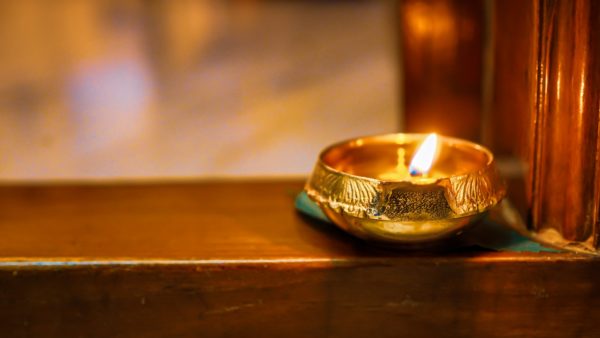 Clay lamps or diyas are lit to illuminate homes during the festival of Diwali (Photo Credit – Manoj Kumar Kasirajan)
Clay lamps or diyas are lit to illuminate homes during the festival of Diwali (Photo Credit – Manoj Kumar Kasirajan)
When and where is Diwali celebrated?
Diwali is celebrated on the day of the full moon around the end of October and the beginning of November. It is a five day festival, with different significance of each day. The third day of Diwali is the main day and the most important.
Most regions across India celebrate Diwali. Diwali celebration in North and Central India is very different compared to the festivities in Southern India. Depending on the state, the religious significance also differs.
Celebrations in most of India take place with great fervour – colours, row of lights, chaos, fireworks, loud gatherings, and noise. However, in Southern India, celebrations are quite subtle even though the traditions are similar.
So if you want to experience Diwali in the true sense, you need to be in the western, central or northern India during this time.
Check out our route suggestions for North India to find out how to plan your trip around the festival.
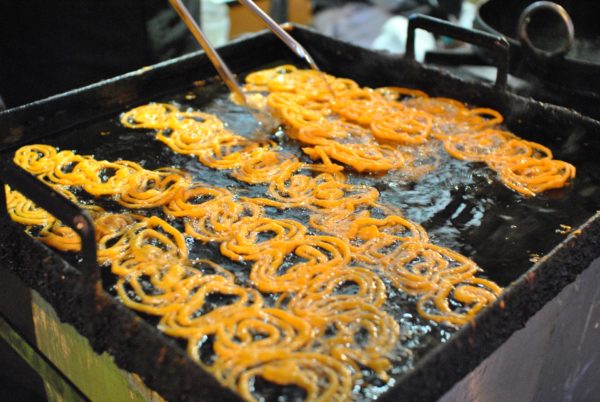 Make sure you eat Jalebi, which is a famous deep fried Diwali sweet (Photo Credit – Zera Li)
Make sure you eat Jalebi, which is a famous deep fried Diwali sweet (Photo Credit – Zera Li)
How is Diwali celebrated?
Diwali is a five day celebration in India, and each day has a special significance.
The celebrations start with Dhanteras on the first day. On this auspicious day, Indians clean and decorate their houses and prepare for the festival. Many people purchase gold items on this day, as it is considered auspicious. People of Hindu faith also honor Goddess Lakshmi, the goddess of wealth and good fortune.
The second day is Narak Chaturdashi, or Choti Diwali. People celebrate by waking up early in the morning, lighting up their house with oil lamps and bursting crackers. They also draw rangolis outside their house.
The third day of Diwali is Lakshmi Puja. This is the main day of the festival of lights. Hindus ask for blessings from Goddess Lakshmi on this day. You will find lighted lamps, rangolis, and firecrackers outside most homes on this day.
The fourth day of Diwali is Padwa or Goverdhan Puja. This day honours the environment and nature. This is considered to be the start of a new year. People visit friends and family on this day and exchange gifts. They also have lavish meals together.
Bhai Dooj is the fifth day of Diwali. It celebrates the special bond between siblings. Brothers visit their sisters’ homes on this day, bringing gifts. In turn, sisters prepare a feast for the brothers and give them gifts as well.
We recommend experiencing all 5 days of Diwali during your trip.
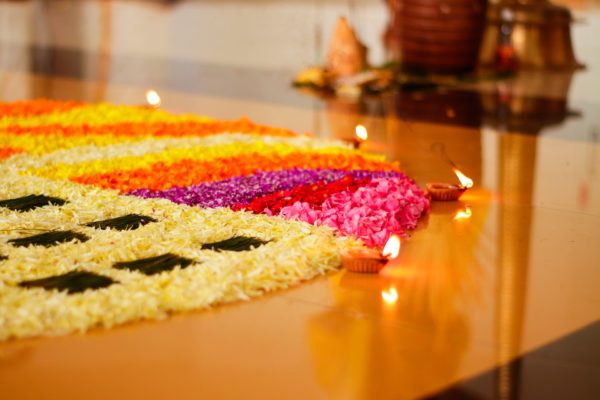 Beautiful combinations of diyas and flowers adorn houses (Photo Credit – Nithin P John)
Beautiful combinations of diyas and flowers adorn houses (Photo Credit – Nithin P John)
What are the best places to celebrate Diwali in India?
If you’re travelling to India during Diwali, we will always accommodate you in North India during the festivities. A homestay can be a great experience to celebrate Diwali with a family, but they get booked in advance. Some homestays only prefer to host friends and family. But do not worry, hotels have Diwali celebration too – you cannot escape the Diwali spirit, irrespective of where you stay.
In terms of destinations, any place in Rajasthan is great for Diwali. You will see lots of festivities and firecrackers in bigger cities like Mumbai and New Delhi. Towns like Agra, Orchha and Khajuraho located in the state of Uttar Pradesh and Madhya Pradesh are great for Diwali.
You can go to Varanasi and watch the amazing aarti and the mesmerising fireworks by the Ganges River. Varanasi also celebrates the festival of Dev Deepawali – the Diwali of the Lords. This celebration takes place 15 days after Diwali. It is believed that the Lords come down to Earth to take a dip in the holy waters of Ganga and all the 84 ghats are lit with clay lamps for their welcome. This is a sight worth witnessing as along with celebrations, multiple rituals take place as well.
Jaipur markets are completely lit up and are an absolute visual delight during Diwali. Goa has a special tradition of burning effigies of the demon Narakasura. Though Amritsar has a majority Sikh population, it is worth witnessing the celebrations at the Golden Temple. It doesn’t necessarily matter where in Northern India you celebrate Diwali, just make sure to not travel on the day of Diwali to really experience the Diwali festival to the fullest. Get in touch with us for recommendations for accommodation to experience this festival of lights at its best.
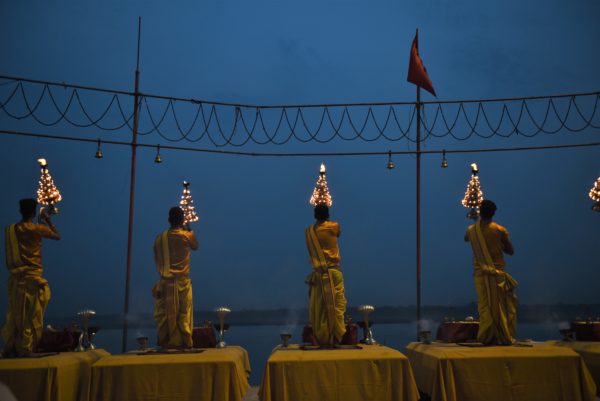 Diwali celebrations in Varanasi are a breathtaking sight to witness
Diwali celebrations in Varanasi are a breathtaking sight to witness
Safety TIPS FOR EXPERIENCING DIWALI IN INDIA
Diyas and firecrackers are everywhere during the Diwali festival, so be careful with your clothes catching fire (especially girls wearing ‘dupattas’ or ‘Indian scarves’). If your ears are sensitive, we suggest taking earplugs as some firecrackers are extremely loud and can sound more like explosions. There can also be a lot of smoke in the air, compromising the air quality of the region. Don’t keep your face too close when lighting fireworks and rush to a safe distance once lit. We highly recommended that you constantly supervise children to avoid any accidents.
Burning of firecrackers during the festival can lead to air pollution especially in big cities like Delhi. In order to steer clear of any infection, it is best that you wear a mask to avoid inhaling this air. Celebrating Diwali in India in smaller cities like Rishikesh and varanasi guarantees an authentic cultural experience. Smaller towns continue to celebrate Diwali in accordance with ancient traditions. The ideal way to understand the rich history and culture of India, we highly recommend celebrating this festival in such towns.
If you have a respiratory condition, please let us know in advance so we can make sure you avoid cities with very high levels of air pollution.
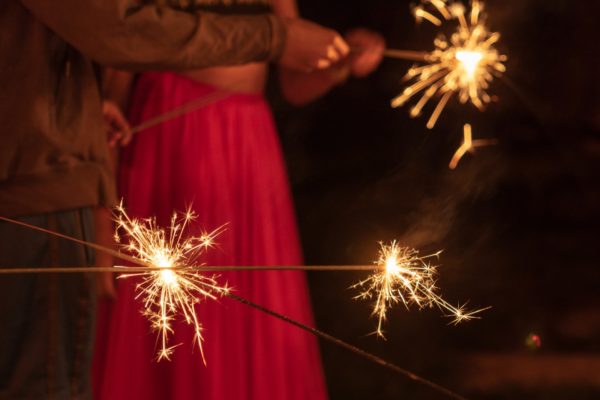 Firecrackers are fun, as long as you maintain safety (Photo Credit – Madhukar Kumar)
Firecrackers are fun, as long as you maintain safety (Photo Credit – Madhukar Kumar)
Travelling in India during Diwali
If you are travelling to India during Diwali, the festival of lights, make sure to book all your inter-city commutes and accommodations well in advance – train tickets, hotel bookings and guides become harder and more expensive to book as the festival approaches. Most people make a booking well in advance for accommodation in major tourist cities. However, the most difficult thing to procure is train tickets, as people travel all over India to visit their loved ones.
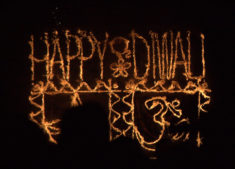 Travel with India Someday to truly experience Diwali in the best way possible
Travel with India Someday to truly experience Diwali in the best way possible
For more information, visit our blog post on the must-experience festivals in India. Alternatively, feel free to contact us for more information about experiencing the festival of lights. If the dates that suit your convenience are nowhere close to this festival, get in touch with us. We’ll help you plan a trip that allows you to experience other popular festivals while still experiencing the vibrant culture of this subcontinent.
FAQs:
Why is Diwali celebrated?
There are many stories about the origin of Diwali, but in each story, the theme is the triumph of light over darkness. This is why, Diwali is known as the festival of lights and is celebrated by lighting diyas (clay-lamps) and bursting firecrackers.
Why is everything booked during Diwali?
Diwali takes place during October or November every year, which is peak travel and tourism season. People go for vacations during this long holiday. So, hotels and homestays get booked in advance. For this festival, families gather together to celebrate. People travel from all over to be with their friends and families during this time, so inter-city modes of transport are mostly booked.
Is Diwali a national holiday in India?
Diwali is not a national holiday in India, but it is an important holiday nonetheless. It is a public holiday in most parts of India.
What can you expect to see and experience on the day of Diwali?
As the name suggests, on the festival of lights, you will see clay diyas outside every house in most of India. The oil diyas (lamps) are lit up early in the morning and late in the evening. There will be a festive vibe all around. People buy and wear new clothes and exchange sweets and gifts with each other. At nights, you will see everyone bursting fireworks on the streets. Although Diwali is not a national festival in India, it is celebrated by most people in the country.
Don’t know how to incorporate the Diwali festival into your India travel plans? Afraid it’s too late to plan for Diwali? We’ll make it possible, don’t worry. Plan Your Trip with us now!
helping you travel your way
Everything you need to know about India is here We have tried writing about everything you may need help with for your trip to India, If you need help in planning a trip to India Get in touch with us to to plan your trip of a life time.


